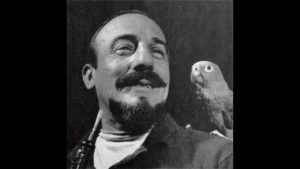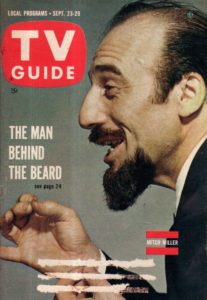
On Independence Day, 1911, Mitchell William Miller was born in Rochester, New York. Naturally gifted at music, Miller went to the Eastman School of Music, where he excelled in the oboe and English horn. By the 1930’s and 40’s, he was working as a session musician, backing up many of the most famous artists of the day. In 1938, he was playing in the studio orchestra as Orson Welles was scaring the daylights out of our parents with his War of the Worlds broadcast.
Mitch got into the record production business. He proved to be a prolific producer of hits that, once again, our parents listened to. His first smash was Frankie Laine’s Mule Train.
In 1961, he became the host of Sing Along with Mitch. It was a very mainstream effort at keeping families singing together just like they had done in the previous decades. And, in fact, it was quite successful, lasting three seasons.
Once upon a time, families gathered around the radio to hear music. Woody Allen’s wonderful, overlooked classic film Radio Days summarizes the era perfectly. It seems strange today, when I listen to Neil Young and Bruce Springsteen, and my son listens to Green day and Radiohead, and neither of us has a clue what the other’s favorites are all about. But, then again, we both listen to Counting Crows, so there’s hope.

Mitch was judged by many to be an anti-rock and roll zealot. But the accusation simply doesn’t hold water.
Mitch stuck with his favorite music. While he didn’t go out of his way to promote the new sounds, that certainly didn’t make him an enemy. In fact, while heading Columbia Records, he tried to sign Elvis, but chose not to take up manager Colonel Parker’s offer. Nobody can fault him for not wanting to deal with a manipulative dictator.
Mitch lost his job at Columbia for not signing enough teen-popular acts, though. But his last hurrah was Sing Along with Mitch, where audiences at home were encouraged to follow the bouncing ball and join in with Mitch and His Gang.
The show was ridiculed by youngsters, one of the earliest manifestations of the Generation Gap. But I can only remember one song distinctly that I heard on the show, so many years ago. It was written by none other than Woodie Guthrie, held in such high esteem by Bob Dylan himself, who immortalized him in his own Song for Woody. The song was This Land Is Your Land.
Bruce Springsteen called this one of the first protest songs. And the fact that Mitch Miller encouraged all in the family, from Grandma to little Johnny, to sing it, tells me that this apparent middle-of-the-road music exec might have been just a bit more on the ball than the youngsters of the early 60’s might have thought.
BTW, Mitch is still around, 96 years young. Here’s to you, Mitch Miller. May you lead us with the bouncing ball for years to come. (update: Mitch died at the age of 99)
Had a friend of ours call up and ask about Mitch Miller. First thing out of my mouth was the
“Bouncing Ball.” She googled it and said it was only in cartoons. I told her I DO remember
the show with the ball. Ah yes, the good ole days. A baby boomer I am.
when the show went into syndication .